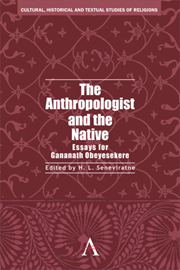Book contents
- Frontmatter
- Contents
- Editor's Note
- The Anthropologist and the Native: Essays for Gananath Obeyesekere
- SECTION I THE INDIAN TRADITION AND ITS REPRESENTATION
- SECTION II CASTE, KINSHIP, LAND AND COMMUNITY
- SECTION III RENUNCIATION AND POWER
- SECTION IV BUDDHISM TRANSFORMED
- ‘Buddhist Revival’ and the ‘Work of Culture’ in Sri Lanka, Past and Present
- Dharmapala's Buddhisms
- Religion and Globalization from the Historical Pespective of Thai Buddhism
- SECTION V THE ENIGMA OF THE TEXT
- SECTION VI THE ANTHROPOLOGIST AND THE NATIVE
- List of Contributors
Dharmapala's Buddhisms
from SECTION IV - BUDDHISM TRANSFORMED
Published online by Cambridge University Press: 05 May 2012
- Frontmatter
- Contents
- Editor's Note
- The Anthropologist and the Native: Essays for Gananath Obeyesekere
- SECTION I THE INDIAN TRADITION AND ITS REPRESENTATION
- SECTION II CASTE, KINSHIP, LAND AND COMMUNITY
- SECTION III RENUNCIATION AND POWER
- SECTION IV BUDDHISM TRANSFORMED
- ‘Buddhist Revival’ and the ‘Work of Culture’ in Sri Lanka, Past and Present
- Dharmapala's Buddhisms
- Religion and Globalization from the Historical Pespective of Thai Buddhism
- SECTION V THE ENIGMA OF THE TEXT
- SECTION VI THE ANTHROPOLOGIST AND THE NATIVE
- List of Contributors
Summary
Among Gananath Obeyesekere's contributions to the study of Buddhism and Sri Lankan modernity, the notion of ‘Protestant Buddhism’ occupies a central place. Over the last thirty-five years, the expression has become standard equipment for conceptualizing the unlikely effects of the colonial encounter. What recommends ‘Protestant Buddhism’ is more than its perfect pitch. It hits the circumstances of the Sri Lankan collision with missionary activity dead on while also capturing the formal qualities —the hybridity, the modularity, the unintended irony and perverse effects— of Asia's interaction with Europe. The juxtaposition of Western form and indigenous tradition marks similar changes across Asia, and in that context ‘Protestant Buddhism’ is simply a token of a type, a hybrid notion itself that captures the hybridity of lives lived amidst disruption, disarray, and skillful invention.
Obeyesekere first made use of the idea in a 1970 essay. He says there that he means the notion in two senses. One, Protestant Buddhism is a set of norms and institutional forms derived from Protestant missionary practice. It includes ‘Young Men's (Women's) Buddhist Associations, Buddhist Army Chaplains, Sunday Schools for Buddhists (till 1965), missionary organizations and various types of Buddhist associations’ (Obeyesekere 1970: 61-62). Two, it was also Protestant in the lower-case ‘p’ sense of the word, protesting against both Christianity and Western political domination. Throughout the nineteenth century, Sinhalas, especially in Colombo and the Western Province, abandoned their traditional religion, dress, social practices, and language —sometimes because of the economic and social advantages of being a Christian (at least nominally), sometimes because of the dislocation that colonialism brought.
- Type
- Chapter
- Information
- The Anthropologist and the NativeEssays for Gananath Obeyesekere, pp. 247 - 272Publisher: Anthem PressPrint publication year: 2011
- 1
- Cited by

